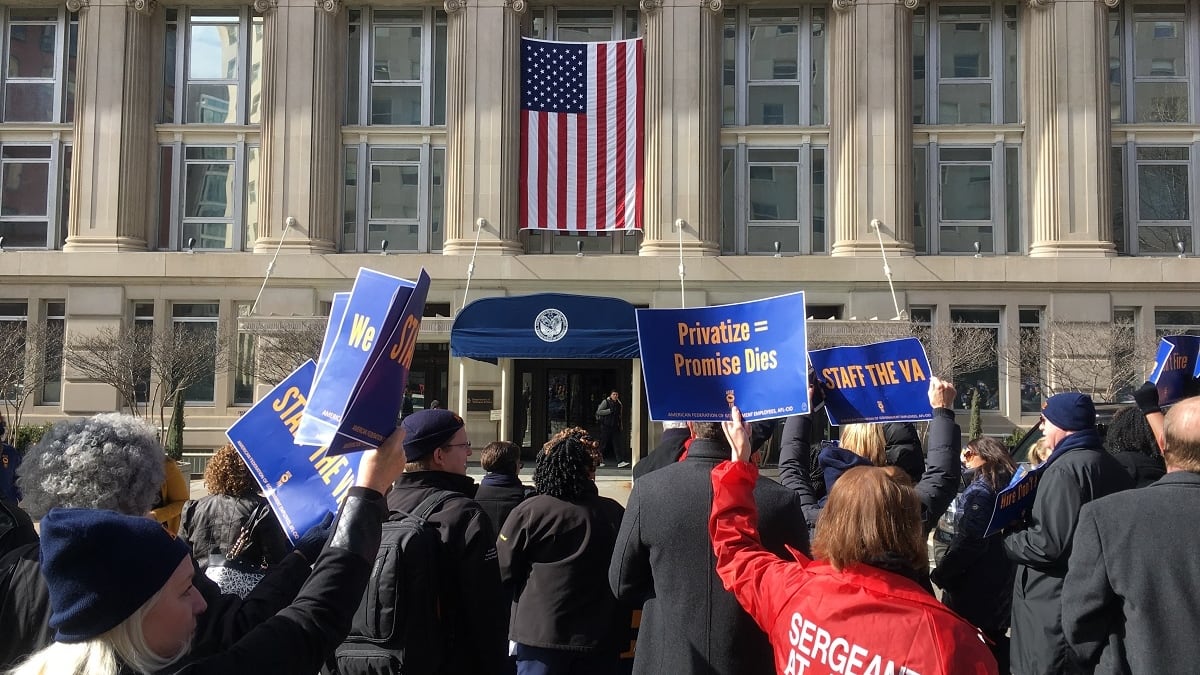Union representatives at the Department of Veterans Affairs will have far more restrictions on their ability to perform union work, as the agency announced Nov. 15 that unions will have to pay for office space and equipment use and representatives will have to spend 75 percent of their time doing non-union work.
Most notably, the rule change notes that the agency will not approve “taxpayer-funded union time for preparing or pursuing grievances, including arbitration, on behalf of bargaining unit employees, except where such use is otherwise authorized by law or regulation.”
Under civil service law, federal unions are required to represent employees that are part of their bargaining unit in grievance proceedings, or risk having an employee report them to the Federal Labor Relations Authority for not fulfilling those requirements.
For all cases of official time, representatives will have to request and receive written approval in advance.
Union officials will also have to pay rent on any supplies or spaces they wish to occupy in the future — prices for which will be released Dec. 13 — and representatives will be kicked out of those office spaces after Jan. 31, 2020, if they choose not to pay that rent.
The new rules come as a response to three union-targeting executive orders signed by President Donald Trump in May 2018, which were blocked by court challenges until very recently.
A federal appeals court ruled that, regardless of whether the orders contradict the intent of Congress and overstep executive power, the courts did not have the authority to rule on the case until it had been brought through the FLRA on an agency-by-agency basis.
In the meantime, administration leaders have argued that official time is a waste of taxpayer money, while unions state that it promotes efficient functioning of government by giving employees an avenue to voice what is wrong with the agency.
“Common sense dictates that VA employees’ main focus should be providing Veterans the best possible care, benefits and customer service. At the same time, unions using VA facilities should have to pay their fair share,” said VA Secretary Robert Wilkie in a news release. “These executive orders will help ensure that’s the case.”
Union officials reported chaos when agencies, including the VA, first moved to enforce the executive orders in July 2018, before a federal judge placed an injunction on such enforcement.
The American Federation of Government Employees reported at that time that union representatives and other employees were having to coordinate break times just to talk about ongoing or potential grievances without doing so on the clock.
AFGE National VA Council President Alma Lee called the rules changes an illegal violation of civil service law:
“This is a punitive and illegal action that’s intended to silence employees and discourage them from reporting mismanagement or other abuses that harm veterans’ care. We will pursue any and all legal options at the national and local levels to challenge this illegal activity and preserve employees’ collective bargaining rights.”
According to the agency, the changes will help save the taxpayers money, by either generating revenue from rent-paying unions or freeing up space for other uses. The change would also move union representatives “back to direct services and medical care.”
But union officials have argued that the problems with care at the VA are more attributable to significant staffing shortages at the agency that were exacerbated by a Trump administration hiring freeze, rather than union representatives taking official time while at work.
Jessie Bur covers federal IT and management.





